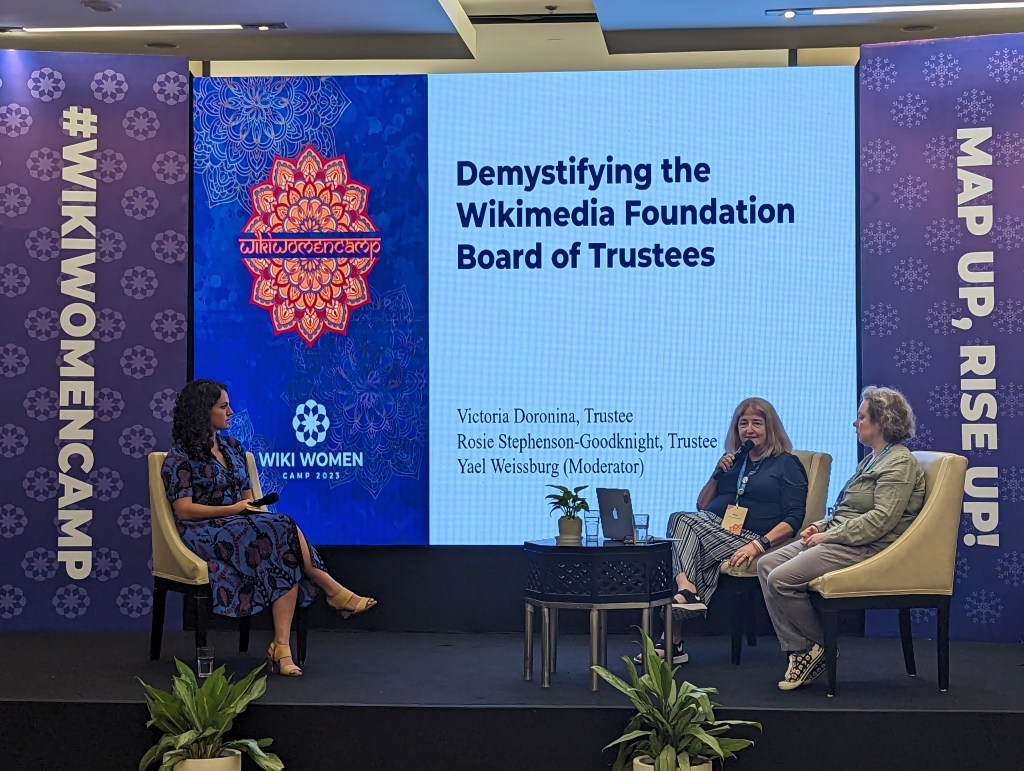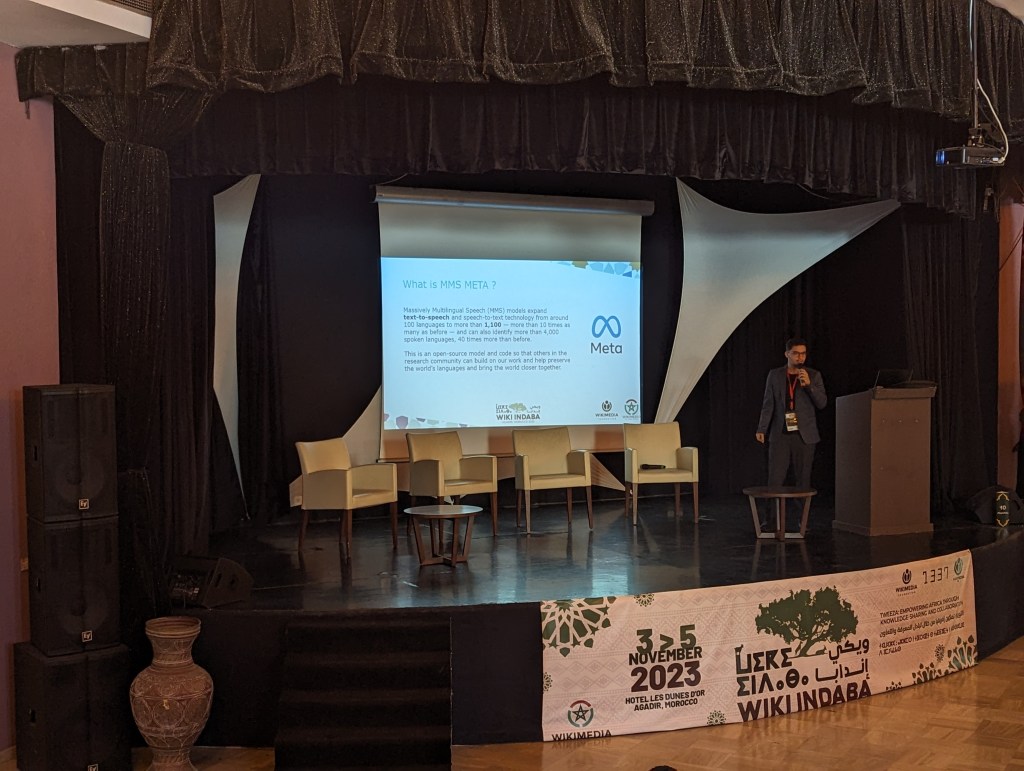Sweet table at Wikimania 2023 (Mwintirew, CC BY-SA 4.0)
This year, I had the incredible opportunity to be part of three major Wikimedia conferences. The first was Wikimania, an annual conference organised by dedicated volunteers and hosted by the Wikimedia Foundation. It was held in Singapore from August 16th to 19th, 2023, with a focus on the theme “Diversity, Collaboration, and the Future.”
Next was Wiki Women Camp, a gathering uniting individuals who identify as women from various countries within the Wikimedia movement. This inspiring event took place from October 19th to 22nd, 2023, in New Delhi, revolving around the theme “Map Up, Rise Up.”
Finally, there was WikiIndaba, a regional conference designed for Africans both within and beyond the diaspora. This event took place from November 3rd to 5th, 2023, in Agadir, Morocco. The conference was centered around the theme “Tweeza: Empowering Africa through Knowledge Sharing and Collaboration.”
All these conferences buzzed with discussions, meetups, training sessions, workshops, and social activities. Each gathering provided me with unique insights and unforgettable moments, significantly enriching my understanding of the Wikimedia movement and its diverse projects.
Wikimania: Hubs and the Sweet Table Analogy
One of the sessions that I was delighted to attend focused on the concept of “hubs.” This interactive and relaxed session allowed participants to exchange insights about hubs, effective strategies, and next steps. Two intriguing highlights emerged from the discussion.
First, an analogy was drawn to Marvel heroes like Spider-Man, Captain America, Iron Man, and Black Panther, who operated individually but united as the Justice League to tackle more significant challenges with greater impact. This metaphor illustrated the essence of a hub perfectly. Another participant likened a hub to a sweet table at Wikimania. Just as attendees bring diverse sweets from their countries to share, hubs gather different perspectives and ideas. An additional comment by a participant online stressed the importance of knowing where the “sweets table” is, which to me resonates with the idea that understanding a hub’s purpose, location, and involvement avenues is crucial. What do you make of these analogies?
The session also highlighted the need for the Movement Charter Drafting Committee (MCDC) to adopt a flexible approach, avoiding rigid guidelines for “hubbers.” I endorse this notion, believing that a balanced mix of both approaches would be valuable. Providing newcomers with guidelines while allowing flexibility for others to adapt to their unique situations is ideal, akin to the activity checklist offered by Wikimania organisers.The checklist serves as a helpful guide for newcomers, while experienced Wikimedians can optimise their participation beyond solely relying on it.
The session concluded with an agreement to establish a shared space for ongoing hub-related conversations, led by key hub leaders. Through the diverse opinions shared, I grasped that a successful hub should possess a shared vision, ensure communication, offer support, and embrace diverse interests, finding a harmonious synergy.
WikiWomen Camp: Taking Initiative and Bridging Gaps

At Wiki Women Camp, a speaker made a profound statement that struck a deep chord: “When opportunity comes, don’t be at the bar drinking.” I deduced from her account of her journey to the board the importance of consistently showing up and taking up learning opportunities. Show up even when, at first, you don’t have anything to say or know nothing about the subject. For some new members within the movement, it is easy to bury our efforts in just editing without partaking in movement discussions or other opportunities to learn because we are shy or feel we do not have anything valuable to add to the discussion. However, I have learned that by consistently showing up, you at least become aware of the problems, solutions, and available resources. Once you become aware, it triggers the need to actively take part by assisting in your small way to find or implement a solution. I believe these are some of the ways in which initiatives such as Wiki Loves Women, Wiki Women in Red, and Wikipedia Pages Wanting Pictures (WPWP), etc. came about. So show up and take up opportunities to learn. Do you agree with me on the notion of consistently showing up and taking up learning opportunities, even when you may feel hesitant or unsure?
P.S. While I had already realised the diversity (Wikimedians from various countries) within the Wikimedia community during Wikimania Stockholm in 2019, attending Wiki Women Camp 2023 further underscored this diversity, particularly in terms of age groups (young and old women), especially among the Indian Wikimedia communities and how effectively they work together. Overall, the conference reinforced the idea that sitting on the sidelines would not contribute to bridging the gaps within the movement and on the various projects; instead, consistent attendance and active participation were key.
WikiIndaba

With so much discussion on artificial intelligence (AI), its uses, and its risks, I was happy to learn about Meta AI’s latest text-to-speech technology, known as Massively Multilingual Speech (MMS Meta), which has the capability to support 1,100 languages worldwide, and the proposal to apply this feature to small language wikis in order to address the challenge of limited access to information for language speakers while serving the audio needs of some readers. Though this feature is good, it comes with limitations, such as repetitive tasks when an article’s audio reflects the previous version rather than the updated one. I believe the open nature of the application will allow contributions to address this limitation, providing real-time information. All in all, this is a good step in making wiki pages friendly to various readers or learners, as is the continued documentation and preservation of oral African languages. In addition to the above, I was happy to learn of the efforts being made to ensure the inclusivity of women in WISCOM as well as the collective initiative to address the challenges faced by African Wikimedia communities. In addressing the issue of inclusivity, I believe this consideration in the first place is a good step. I also believe the invitation of “active” or female leaders within the African community into discussions of WISCOM or even seeking the opinion of these people is another step towards ensuring inclusivity. How about you? If you were to propose additional steps for ensuring inclusivity or addressing the challenges faced by African Wikimedia communities to be taken up by WISCOM, what would they be?
Gratitude and Acknowledgment
Being part of these gatherings was a fulfilling experience. Wikimania, in particular, allowed me to meet other members of the Regional Grants Committee, learn about their review process, and connect with community members I had previously only encountered virtually. Wiki Women Camp and WikiIndaba provided me with the opportunity to share my knowledge and experience on topics such as Community Engagement:Outreach and Facilitating Conversations and Nurturing Female Leadership, and Inclusivity, respectively, and also immerse myself entirely in a new culture. I express my gratitude to the organisers of these three conferences for their dedication, hard work, and meticulous planning. The impact of these conferences was evident in the diverse range of topics covered, engaging sessions, and opportunities to connect with fellow enthusiasts. Together, these elements made the conferences invaluable experiences that fostered collaboration, shared enthusiasm for open knowledge, and the flourishing of ideas.

Can you help us translate this article?
In order for this article to reach as many people as possible we would like your help. Can you translate this article to get the message out?
Start translation